Sweden accuses Iran of using Stockholm mosque for spying
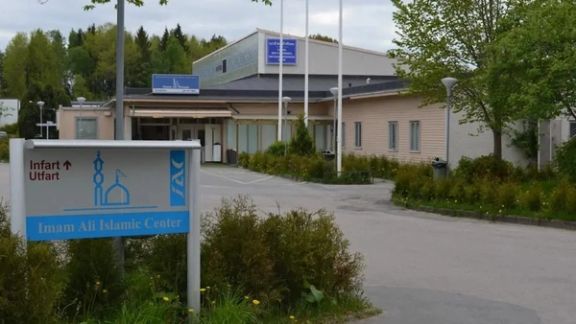
The Swedish government has accused Tehran of using a Shi'ite Muslim mosque in Stockholm to spy on Sweden and the Iranian diaspora there.

The Swedish government has accused Tehran of using a Shi'ite Muslim mosque in Stockholm to spy on Sweden and the Iranian diaspora there.
The Swedish Security Service has assessed that the Imam Ali Islamic Center in Stockholm was used by Iran as a means of spying and conduct activities threatening security, said Sweden's Minister for Social Affairs Jakob Forssmed on his X account.
The Swedish minister called it "extremely serious," adding that Sweden had stopped all state monetary aid to the center. "State funds should not be used for activities that conflict with fundamental democratic values."
"An additional process" is under way, he added, without providing further details.
Iranian cleric Mohsen Hakimollahi, the Islamic Center's imam, was arrested nearly two weeks and faces deportation from Sweden, Expressen reported Friday.
“He has been missing for more than ten days, and we learned through various channels that he is in one of the Swedish Migration Board's detention centers and will soon be deported from the country,” added the source.
The Imam Ali Islamic Center, considered the largest Shi'ite institution in Northern Europe, has not issued a public statement on the matter.
Hakimollahi, aged 63, was transferred from Iran to Sweden to manage the Shi'ite center and had resided in the country for several years, developing connections with local political figures and religious organizations.
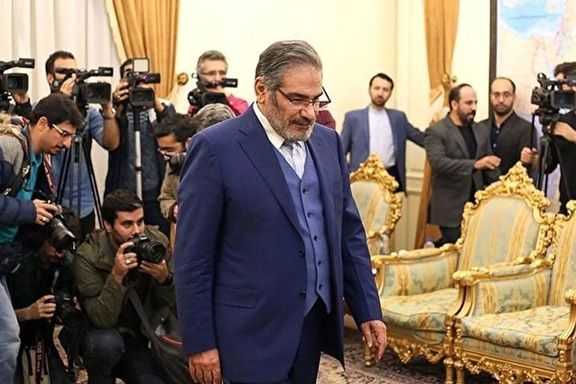
The Islamic Republic has long ruled out developing nuclear weapons, a top political advisor to Iran's Supreme Leader Ali Khamenei said, in dovish remarks pointing to a potential openness to reviving talks with the United States.
"Iran has never sought nuclear weapons and never will," said Ali Shamkhani during a visit to the Atomic Energy Organization in Tehran on Monday.
"However, we will fully defend our legal rights in political and technical aspects with all our strength," the former security chief added.
Western powers say Tehran's expansion of its nuclear program lacks any credible peaceful purpose.
As economic malaise in Iran has deepened, renewed talks with the United States over the disputed nuclear program are widely viewed as the best avenue to ease sanctions.
Iran maintains that it will not pursue nuclear weapons, citing a long-standing fatwa or religious edict by Khamenei banning all weapons of mass destruction, including nuclear arms.
In an October 2019 speech, Khamenei said that building and maintaining nuclear weapons is "absolutely haram," meaning strictly forbidden under Islamic law.
However, analysts argue that the fatwa is merely an advisory opinion rather than a binding legal decree. They say it was intended to mislead the international community about the true intentions of a nuclear program that Tehran insists is peaceful.
Kamal Kharrazi, a senior foreign policy advisor to Khamenei, said last year that Iran has the capacity to produce nuclear weapons and an existential threat could prompt a reconsideration of the Supreme Leader’s injunction.
Iranian authorities have consistently asserted that the country's nuclear program is intended for peaceful purposes.
However, Western powers and independent nuclear experts argue that the levels and quantities of enrichment undertaken by Iran since 2021 go far beyond those needed for energy or scientific research purposes.
"Iran continues to develop its nuclear program to levels that lack any credible civilian justification," France, Britain and Germany said in a joint statement to the United Nations in December.
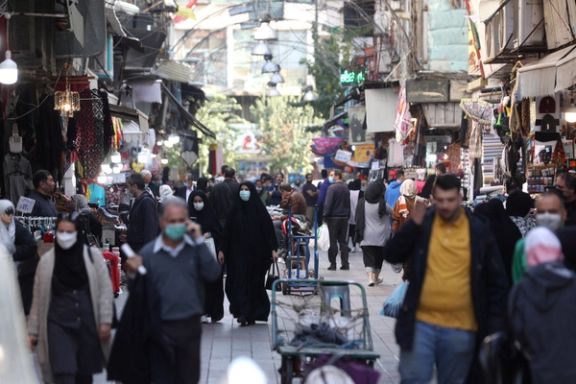
Iranian President Masoud Pezeshkian said on Monday that certain economic difficulties are beyond governmental control, stressing the need to be transparent with citizens regarding such limitations.
"The current situation of high prices and livelihood problems that are putting pressure on the people is unacceptable," he said. "Some of it is in our hands, and some of it is not," he added without elaborating.
Pezeshkian made the remarks during a joint meeting with Parliament Speaker Mohammad-Bagher Ghalibaf, Chief Justice Gholamhossein Mohseni Ejei, and other senior legislative and judicial officials.
Iran's current economic crisis stems from both US and European sanctions, as well as systemic mismanagement linked to the government's bureaucracy and its dominant role in the economy.
Official media often attributes economic responsibility to the presidential administration, but since foreign policy decisions rest with Supreme Leader Ali Khamenei, lifting sanctions is beyond the president's control.
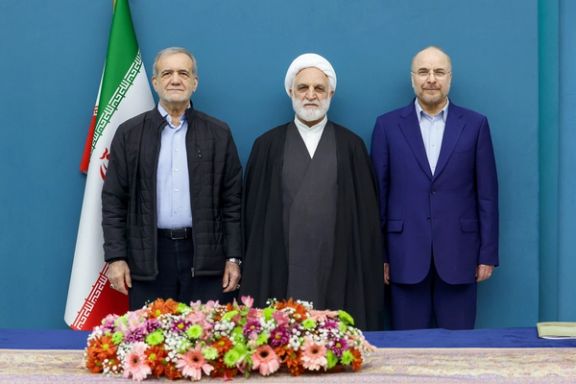
Last month, the Statistical Center of Iran reported significant price increases on essential goods, with some food items seeing prices multiply up to five times compared to last year.
Ordinary workers currently earn less than $150 a month, while official estimates indicate that a family of three needs at least $450 a month to cover basic necessities.
Pezeshkian said it is time to engage the population, at least one third of whom have been pushed below the poverty line, warning that more protests lie ahead.
"When we are unable to fulfill our commitments to the people... if they come to the streets and protest, we must engage in dialogue with them ... but instead, we treat them badly.
"Solving the people's problems is our duty; if we cannot, we should at least explain it to them in a kind manner... not treat them violently."
He accused the country's adversaries of taking advantage of the dire economic conditions, warning: "Of course, the people should also be careful that the enemy does not exploit their protests to disrupt society.”
Acknowledging declining public support for the government, he asked, "In the recent elections, 50 percent of the people did not participate. Are they not one of us, and are we not their servants? Shouldn't we ask ourselves why they are dissatisfied with us?"
Only 24 million of 61 million eligible Iranians voted on June 28 in snap presidential elections called after the untimely death of President Ebrahim Raisi in a helicopter crash.
The 39.9 percent turnout was the worst in the history of the Islamic Republic. Pezeshkian did not secure the 50 percent required to avoid a run-off. The turnout improved in the second round to 49.68%.

The IRGC-linked Fars News on Monday urged authorities to shut down pet supply stores, calling for a halt to the expansion of shops selling clothing and accessories for pets, including dogs and cats.
Fars reported that a group of its readers launched a petition saying these stores promote pet ownership, which they argue poses health risks, although they did not specify what those risks are.
Iranian authorities view pet ownership, especially of dogs, as a sign of Western influence that threatens traditional values and should be prohibited.
Dogs are generally considered 'najis' or 'impure' in Islam and banned in public places by some majority-Muslim countries including Saudi Arabia.
Iranian parliamentarians proposed a bill in 2021 banning selling and keeping of pets, claiming that the ban was meant to protect public health.
While working dogs have always been common in Iran’s rural areas and on farms, keeping pets has only recently become fashionable in urban areas despite occasional police crackdowns.
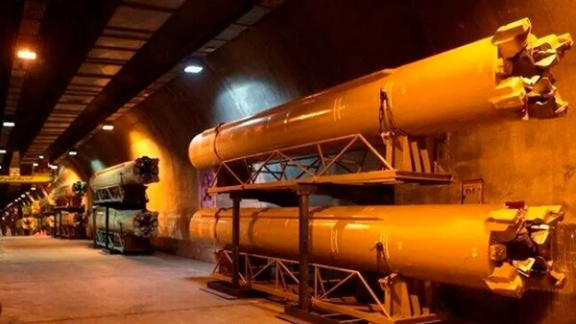
Iran’s Islamic Revolutionary Guard Corps (IRGC) commander-in-chief said that the force’s missile systems "can hit any enemy target in the region and overcome enemy anti-missiles" as the country rebuilds its defences after Israel's October aerial barrage.
Hossein Salami told Tasnim News Agency Monday: “The IRGC today is much more advanced in the field of weapons and much more experienced in skills.”
He described Iran’s military strength as a key factor in deterring adversaries, pointing to past missile strikes as proof of the IRGC’s capabilities.
The comments come just months after an aerial attack from Israel severely damaged Iranian military infrastructure.
The Institute for the Study of War said of the October strike: "The IDF [Israeli military" conducted precision strikes targeting around 20 locations across Iran, including facilities tied to the Iranian drone and missile programs and air defense network."
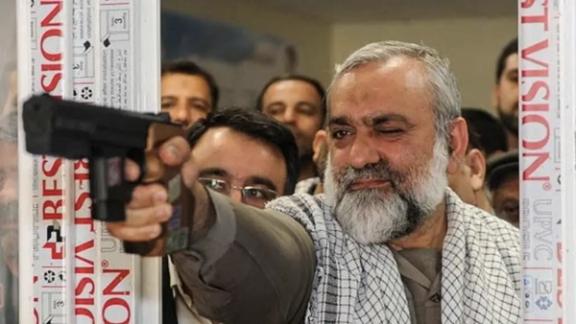
In a separate interview, Mohammad Reza Naqdi, a deputy commander of the IRGC, told state television Sunday: “Whenever we want, we can put any point in the world under the missile range."
The statements come as Israeli Prime Minister Benjamin Netanyahu announced on Sunday that his Monday meeting with US President Donald Trump will include talks on the ongoing threat from Iran.
Reza Naqdi added: “Any range, in any point in the world, that the system and the Supreme Leader wants, is not beyond the technological reach of the Islamic Republic’s military forces.”
Salami highlighted the importance of the IRGC's navy in Iran's defense systems after the IRGC Navy unveiled another underground missile base in the coastal areas of southern Iran on Saturday.
The IRGC also unveiled a new cruise missile, named Ghadr-380, which has "anti-jamming capabilities" and a range of more than 1,000 km (more than 600 miles), according to IRGC Navy Commander Alireza Tangsiri.
Iranian President Masoud Pezeshkian framed Iran’s ballistic missile and space launch programs as defensive rather than offensive on Sunday.
“We have worked to continuously strengthen our defense capabilities with the efforts of dedicated, innovative young scientists,” he said at a military exhibition.
“This development will continue, and dear Iran will join the ranks of countries conducting extraterrestrial flights, showcasing our nation's scientific strength.”
Iran has developed an estimated arsenal of 3,000 ballistic missiles, according to US intelligence assessments.
Iran launched hundreds of drones, rockets and ballistic missiles at Israel last year, demonstrating its ability to strike its archenemy despite extensive missile defenses.
Iranian hardliners have warned that a return to diplomatic negotiations under Donald Trump could include renewed efforts to curb Iran’s missile program.
Tehran has repeatedly ruled out missile-related talks, maintaining that its military strategy is non-negotiable.

A former British soldier who escaped from custody while facing charges of gathering sensitive information for individuals linked to Iran’s IRGC was sentenced to 14 years and three months in prison at Woolwich Crown Court in London on Monday.
Daniel Khalife received six years for breaching the Official Secrets Act, six years for a terrorism offense, and two years and three months for escaping from prison, with the sentences to be served consecutively.
Khalife, 23, joined the British Army in 2018 and served with the Royal Corps of Signals. While enlisted, he "exposed military personnel to serious harm" by gathering and passing on sensitive information to Iran.
The judge said Khalife "took payment on two occasions and traveled to meet intelligence officers from Iran in Turkey." She noted that he "recorded a great deal of information," including the full names of fellow soldiers, and was "driven firmly to the conclusion that this was to send to the Iranians."
Khalife, who escaped from Wandsworth Prison in September 2023 but was caught days later, passed information to Iranian agents for cash and told handlers he would stay in the military for more than 25 years to serve them.